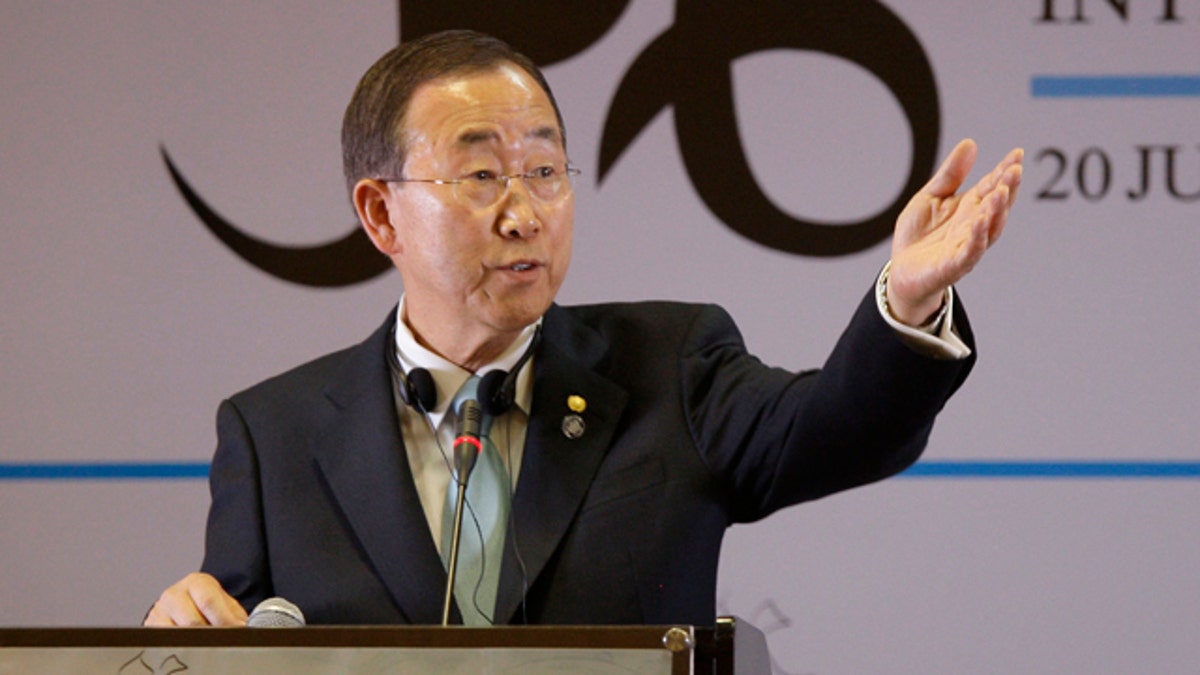
July 20, 2010: U.N. Secretary General Ban Ki-Moon takes a question during a joint press conference with Afghan President Hamid Karzai. (AP)
Please see update, which includes the U.N.'s response, below the story.
After he first took office in late 2006, United Nations Secretary General Ban Ki-moon proudly proclaimed that he was willing to disclose his private financial assets and other interests -- and urged his top officials to follow suit.
To make that easier, he created a public website where the U.N.’s senior officials -- under secretaries general and assistant secretaries general -- could post highly sanitized versions of the confidential financial disclosure statements they were required -- as of May 2006 -- to file with the U.N. Ethics Office in connection with their jobs.
The decision to participate was voluntary, Ban said. Nonetheless, he declared, such public disclosure was important “as it demonstrates that U.N. staff members understand the importance of the general public and U.N. member states being assured that, in the discharge of their official duties and responsibilities, staff members will not be influenced by any consideration associated with his/her private interests.”
If the aim of the website is to provide, as Ban says, assurance that U.N. officials are not influenced by private concerns, there is a lot not to be assured about.
Using an official list of the 185 top-ranking officials in the United Nations, Fox News has calculated that just fewer than half -- about 90 -- have made the voluntary disclosure statements urged by Ban five years ago.
The 2010 declarations actually refer to financial interests held by officials in the previous year. Thus, some of Ban’s highest-level appointees, even if they have held office for more than a year, do not appear on the website, if they did not hold their jobs in 2009.
In fact, the real ratio is substantially lower than that -- more like one-third. Reason: Ban offered his top officials an easier way out, if they chose, which would count as equivalent to public disclosure: a public declaration that they were choosing not to disclose -- a kind of opaque transparency, as it were, that the U.N. apparently considers a valid participation in Ban’s confidence-building effort. More than 20 officials took that route.
Despite that virtual freebie, about 44 percent of the U.N.’s top officialdom have ignored the website and Ban’s example entirely, at least for 2010, the most recent year online. A smaller number of top appointees won’t be eligible to file until next year.
CLICK HERE TO VIEW THE WEBSITE
While Ban has made much of the fact that he and his deputy secretary general, Asha-Rose Migiro, have voluntarily filed their finances, some of those absent from the website are nearly as important.
CLICK HERE FOR BAN’S DISCLOSURE FORM
Among them:
-- Helen Clark, the head Administrator of the powerful United Nations Development Program, the U.N.’s anti-poverty flagship. Clark’s No. 2, Associate Administrator Rebeca Grynspan, has filed a reasonably detailed statement.
--Lynn Pascoe, the U.N.’s under secretary general for political affairs.
--Robert Orr, an Assistant Secretary General responsible for policy planning.
A number of $1-a-year U.N. appointees, including Ban-appointed special envoys and representatives who nonetheless hold U.N. rankings equivalent to under secretary general and assistant secretary general, have also held out.
One of them is former U.S. President Bill Clinton, Ban’s special envoy for Haiti. Questions from Fox News to Clinton’s office about his absence from the list, sent on November 2, had not been answered before this article was published.
Another is Jeffrey Sachs, Ban’s high-profile special adviser for the Millennium Development Goals and a major fundraiser for all U.N. anti-poverty activities.
Most of the forms that were actually filed as a disclosure of financial interest offer such cursory statements under assets as “house, joint with family members,” “ mutual funds,” or unspecified numbers of shares in often unspecified companies.
One high official, Ad Melkert, most recently Ban’s powerful special representative for Iraq, and previously associate administrator of UNDP, lists as his sole asset “Boat, U.S.A.”
Most forms list no liabilities, except for the occasional mortgage. The same goes for outside board memberships.
Indeed, the most common word on all of the public disclosure forms is “nil.”
Ban himself had no comment on the success of the voluntary disclosure effort or the participation of his officials when queried by Fox News.
UPDATE: Two days after Fox News published this report, the director of the U.N. ethics office, Joan Dubinsky, wrote Fox News about Ban’s disclosure program, declaring that “unlike some government programs that require mandatory public disclosure, the U.N. must find the right balance between transparency, accountability, respect for diversity, and privacy.” She underlined that all U.N. financial disclosure forms, whether made public or not, “are subject to rigorous scrutiny done by an external public accounting firm to ensure the transparency and integrity of the financial disclosure program.”
CLICK HERE FOR DUBINSKY’S LETTER
George Russell is executive editor of Fox News and can be found on Twitter@GeorgeRussell.
